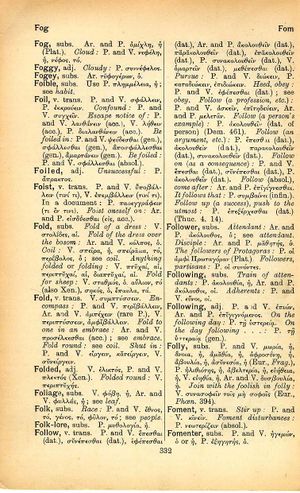following: Difference between revisions
From LSJ
Θεὸς πέφυκεν, ὅστις οὐδὲν δρᾷ κακόν → Deus est, qui nihil admisit umquam in se mali → Es ist ein göttlich Wesen, wer nichts Schlechtes tut
(Woodhouse 3) |
(CSV4) |
||
| Line 1: | Line 1: | ||
{{ | {{Woodhouse1 | ||
| | |Text=[[File:woodhouse_332.jpg|thumb|link={{filepath:woodhouse_332.jpg}}]]'''subs.''' | ||
<b class="b2">Train of attendants</b>: P. [[ἀκολουθία]], ἡ, Ar. and P. ἀκόλουθοι, οἱ. | |||
<b class="b2">Adherents</b>: P. and V. εὔνοι, οἱ. | |||
'''adj.''' | |||
P. and V. ἐπιών, Ar. and P. ἐπιγιγνόμενος. | |||
<b class="b2">On the fallowing day</b>: P. τῇ ὑστερείᾳ. | |||
<b class="b2">On the day following ...</b>: P. τῇ ὑστεραίᾳ (gen.). | |||
}} | }} | ||
Revision as of 09:40, 21 July 2017
English > Greek (Woodhouse)
subs.
Train of attendants: P. ἀκολουθία, ἡ, Ar. and P. ἀκόλουθοι, οἱ. Adherents: P. and V. εὔνοι, οἱ. adj. P. and V. ἐπιών, Ar. and P. ἐπιγιγνόμενος. On the fallowing day: P. τῇ ὑστερείᾳ. On the day following ...: P. τῇ ὑστεραίᾳ (gen.).

